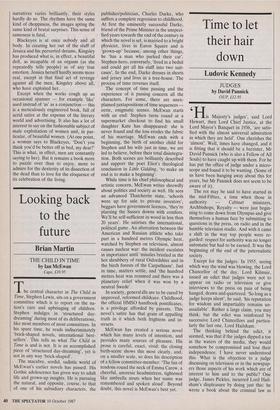Looking back to the future
Brian Martin
THE CHILD IN TIME by Ian McEwan Cape, £10.95 The central character in The Child in Time, Stephen Lewis, sits on a government committee which is to report on the na- tion's care and upbringing of children. Stephen indulges in 'structured day- dreaming' during most of its deliberations, like most members of most committees. In his spare time, he reads indiscriminately 'brick-shaped novels, international best- sellers'. This tells us what The Child in Time is and is not. It is an accomplished piece of 'structured day-dreaming', yet is not in any way 'brick-shaped'.
The macabre, sordid, sadistic world of McEwan's earlier novels has passed. His Gothic adolescence has given way to adult life and grown-up insights. He is pursuing the natural, and opposite, course, to that of one of his subsidiary characters, the publisher/politician, Charles Darke, who suffers a complete regression to childhood.
At first the eminently successful Darke, friend of the Prime Minister in the unspeci- fied years towards the end of the century in which the novel is set, is married to a bright physicist, lives in Eaton Square and is 'grown-up' because, among other things, he 'has a man who parked their car'. Stephen-hero, conversely, 'lived in a bedsit and could get all his stuff into two suit- cases'. In the end, Darke dresses in shorts and jersey and lives in a tree-house. The process of time reverses itself.
The concept of time passing and the experience of it passing concern all the characters. For some, there are unex- plained juxtapositions of time sequences — eerie, enigmatic scenes. McEwan starts with an end: Stephen turns round at a supermarket checkout to find his small daughter Kate has disappeared: she is never found and the loss erodes the fabric of his marriage. McEwan ends with a beginning, the birth of another child for Stephen and his wife just in time, we are led to believe, before their total disintegra- tion. Both scenes are brilliantly described and support the poet Eliot's theological conclusion in Little Gidding, `to make an end is to make a beginning'.
While time is his chief philosophical and artistic concern, McEwan writes shrewdly about politics and society as well. He sees an advanced Thatcherite state, 'schools were up for sale to private investors', beggars have government licences, 'they're planting the Sussex downs with conifers. We'll be self-sufficient in wood in less than 20 years'. He satirises the international, political game. An altercation between the American and Russian athlete who take part in a hundred metres Olympic heat, watched by Stephen on television, almost causes nuclear war: the incident escalates in importance until 'missiles bristled in the hot shrubbery of rural Oxfordshire and in the birch forests of the Carpathians'. Just in time, matters settle, and 'the hundred metres heat was resumed and there was a planetary relief when it was won by a neutral Swede'.
In society, generahills are to be cured by improved, reformed childcare. Childhood, the official HMSO handbook pontificates, is a privilege afforded by parents. This novel's satire has that grain of appalling truth in it which both frightens and in- structs.
McEwan has created a serious novel which has many levels of intention, and provides many sources of pleasure. His prose is careful, exact, vivid: the closing birth-scene shows this most clearly, and, on a smaller scale, so does his description of a fellow committee-member: 'The fan of tendons round the neck of Emma Carew, a cheerful, anorexic headmistress, tightened like umbrella struts when her name was remembered and spoken aloud'. Beyond doubt, this novel is McEwan's best yet.


























































 Previous page
Previous page